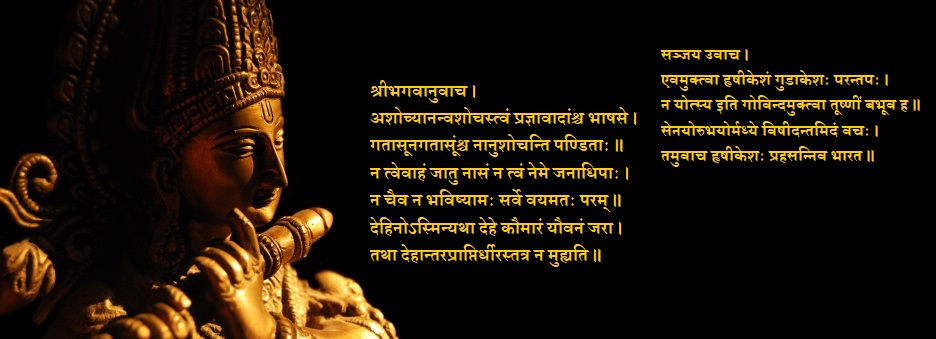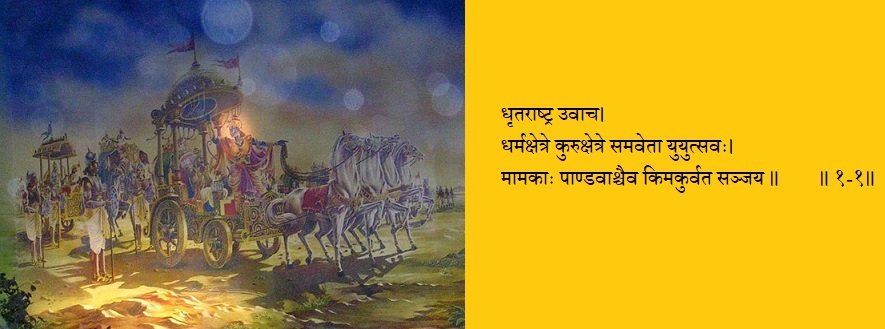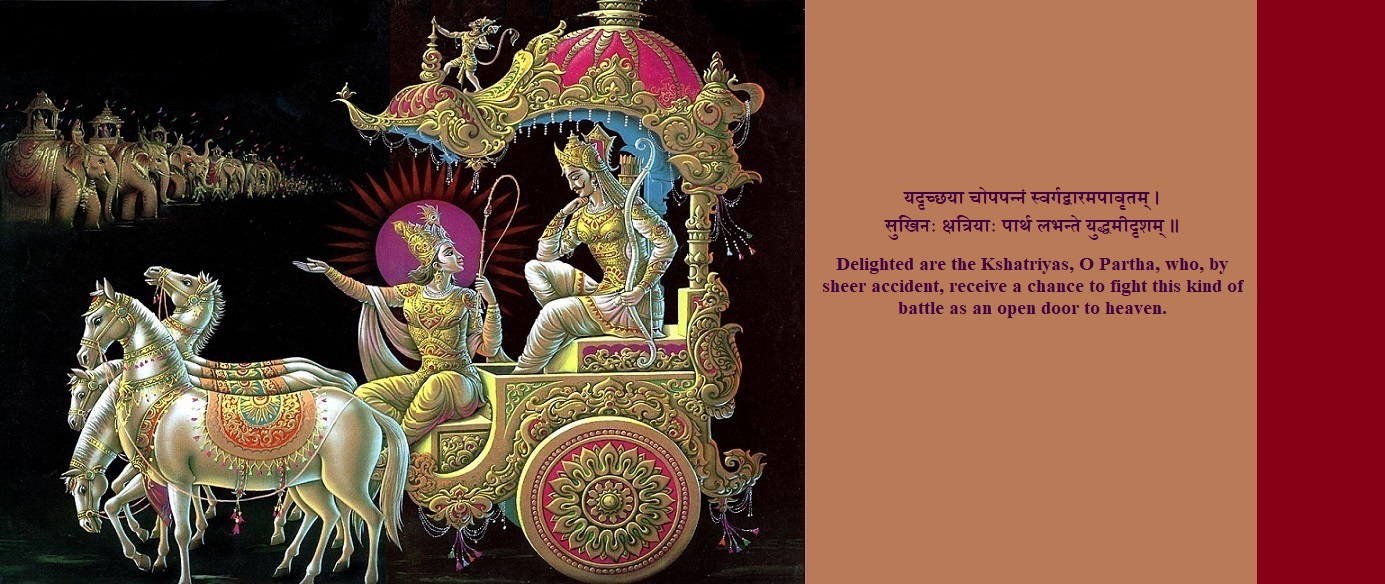The Bhagavad Gita, Chapter 1, Verses 20 ...25
[The war has just started. Arjuna expresses his desire to observe the entire battle-ready soldiers assembled on the two sides.]
Translation
O King, thereafter, as the flight of arrows was just beginning, Arjuna, bearing the monkey-ensign flag (on his chariot), raised his bow; and then, seeing the sons of Dhṛtarāshṭra positioned battle-ready, he told Kṛshṇa these words.
Annotation
If we go deep into the minute details, we recognize Arjuna notices the start of the battle a little late! He sees the missiles are already flying across, and realizes that he has to be acting as well. Of course, he lifts his bow to get ready for the battle but not able to stay focused, as it appears. The battle-ready Kauravas catches his attention, and then he turns to speak to Kṛshṇa. We do not find any sense of urgency in the present behavior of Arjuna, when the top hero of the Pāṇḍava army should lead the rest by springing into action and displaying his ever-superior skills in archery.
Is he lost in thoughts? Or does something worry him?
Let us see what he is up to.
[Bearing the monkey-ensign flag: Hanuman had promised Bhīma to support the Pāṇḍavas in the war by being present on Arjuna’s flag ̶ Āraṇya Parva of the Mahābhārata.]
So far, we have seen the simultaneous build-up of the war and of the spiritual teaching. The dialogue between Kṛshṇa and Arjuna begins now. But let us keep in mind that the stage is not yet ready to begin the spiritual instructions of the Gita. Now begins the unfolding of the situation for Kṛshṇa to teach Brahma-vidya (the Science of the Absolute). Vyāsa characterizes Kṛshṇa as the direct representation of Brahman, so we learn Brahma-vidya straight from its source!
In order to hear Arjuna’s opening words in the Bhagavad Gita, let us read together the latter half of verse 21 and the next two verses.
Translation
Arjuna said: O Achyuta (Kṛshṇa), let me look at all those who have assembled here, standing ready to fight this battle and bring delight to the evil-minded Duryodhana. Please stop the chariot right in the middle of the two armies until I finish observing all the people with whom I have to fight in this war, and also this army of ours, eager to fight, marshaled on the battlefield.
Annotation
Arjuna wants to observe the people with whom he should fight (the Kaurava army) and also “this army”, desiring to fight, marshaled on the battlefield [etān avasthitān yoddhu-kāmān (एतान् अवस्थितान् योद्धुकामान्)]. The latter refers to the Pāṇḍava army. And he wants to look at them together, so he asks Kṛshṇa to stop his chariot between the two armies who face each other. What a dangerous place to stand when arrows and missiles are already flying across!
As we reflect on the way the verse is worded, it reveals Arjuna has become conscious about the desire of both the armies to fight the battle; he sounds as though he wanted to detach himself from the two armies and look at the soldiers on both sides. Further, his reference to Duryodhana as evil-minded is a vivid manifestation of his thought: his evil mind is the sole reason for this war that will kill millions! The previous verse has signaled that he has been in a pensive mood at the very moment he should have been in action.
Arjuna is now going to stand between the two fighting armies and watch them, unperturbed by the ongoing battle. Perhaps he has something to say too. A person in a normal mind, however brave he/she is, would call it a foolish act.
The present scene will seem exaggerated to the rational people like us. Reflected deeply, we will find it acceptable for two reasons. First, the Gita is part of a work of art (the Mahābhārata), which is composed in a style that includes copious usage of symbolism, mythology, etc. to illustrate the inexplicable doctrine of the Absolute. The author’s intent is to describe the philosophy as intelligible as possible. Second, the context is gradually shifting to the realm of the all-powerful Brahman, where we do not know what is possible and what is not.
The other important point is the reader should have accepted the postulate that Brahman, the one and only Truth, exists as the primal cause of the universe. As part of the śraddhā discussed elsewhere, the acceptance of the principle of Brahman is essential for the study of the Gita. [To read a description of śraddhā click/tap on this link: śraddhā]
When the Gita is about to teach its science, there is room for the poet to attribute Arjuna’s strange mannerisms to the influence of Brahman. But then, how one acts under the influence is beyond the comprehension of ordinary human reasoning; a ṛshi alone knows for sure what could happen in such a case. (We will soon come across in this chapter a verse that suggests this is an instance of a case like that).
We have already had a preliminary discussion of Brahma-tattva where we found Brahman itself is beyond the grasp of normal human reasoning; the yogis know the Reality as an intuitive experience. Brahma-vidya enlightens, so the Gita too, how one may transcend the normal human reasoning and experience Brahman, which is our true nature and the only Reality. [To read about Brahma-tattva (the doctrine of Brahman) click/tap on this link: Brahma-tattva]
Sañjaya now describes Kṛshṇa’s reaction to Arjuna’s request. In the following verse, we hear Kṛshṇa’s one-sentence reply to Arjuna, as Sañjaya reports. Except for this, all later conversations of Kṛshṇa are presented as direct speech.
Translation
Sañjaya said: O Bhārata (Dhṛtarāshṭra), having been told thus by Gudākeśa (Arjuna), Hṛshīkeśa (Kṛshṇa) stationed the finest of chariots between the two armies, facing Bhīshma, Drona and all other kings as well, and said, “O Pārtha (Arjuna), behold the Kurus gathered here.”
Annotation
Kṛshṇa, ever cool and composed as he is, promptly stops the magnificent chariot where Arjuna wanted to stand and watch the two fighting armies. He then asks him to see all the Kurus assembled there. He has not asked to look at the Kauravas, which would refer to the army of Duryodhana alone, whereas when he mentions the Kurus, it includes the Pāṇḍavas as well.
In fact, by referring to all the Kurus, Kṛshṇa brings Arjuna’s attention to both the armies in totality.
The all-knowing Kṛshṇa, nonchalant in disposition, should know what thoughts are at present crossing Arjuna’s mind and whether he has felt any concerns. As the charioteer of Arjuna, he continues to do his duty and waits.
-----------------
(To read the next post [Gita Post #9] click/tap on this link: https://www.ekatma.org/node/187)
If you have not subscribed yet,







Comments (2)
Now all became clear to me, I thank for the necessary information.
Welcome. Namaste!
Leave a comment